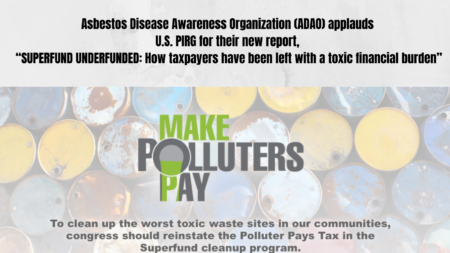Posted on February 10, 2021
The Asbestos Disease Awareness Organization (ADAO) applauds U.S. PIRG for their new report, “SUPERFUND UNDERFUNDED: How taxpayers have been left with a toxic financial burden,” which investigates how taxpayers ended up footing the bill for corporate negligence at Superfund sites. The report examines the program created by Congress to clean up contaminated waste sites. Though originally greeted with enthusiasm, cleanup of these polluted sites through the program has slowed over the years, putting more people at risk of disease and contamination from these hazardous pollutants, such as asbestos.
The Comprehensive Environmental Response, Compensation and Liability Act (CERCLA) was passed in 1980. Informally called the Superfund program, it was meant to hold polluters responsible for cleaning up their own messes. According to the PIRG report, “From 1999 to 2020, annual appropriations decreased by more than a billion dollars from $2.3 billion to just under $1.2 billion in constant 2020 dollars.” 
The report comes at an incredibly important time, as the U.S. welcomes a new administration, one dedicated to protecting public health and our climate. One in six Americans lives within three miles of a proposed or approved Superfund toxic waste site, according to the PIRG report, increasing the risk to the health and safety of citizens across the nation.
PIRG writes that, “Less than a quarter of the more than 1,700 sites that have been added to the list since it was created in 1980 have been deleted, which is the final step in confirming all cleanup goals have been achieved at the site.”
Asbestos, a known carcinogen that kills nearly 40,000 Americans each year, has hundreds of Superfund sites in existence across the country. Any level of asbestos exposure can cause deadly diseases including mesothelioma, asbestosis, and cancers of the lung, ovaries, and larynx. The Superfund site in Davidson, North Carolina, was just featured on a three-part documentary series entitled “Asbestos Town.” As highlighted in WFAE’s series, asbestos Superfund sites contribute to environmental injustice and human rights violations, as they are often located in low-income communities of color, leaving underserved communities extremely vulnerable.
Another factor the PIRG report highlights is the increase in natural disasters. “Hurricanes, floods, and sea-level rise threaten to sweep toxic chemicals from Superfund sites into nearby communities, and more severe hurricanes are becoming more frequent,” details the report.
If you’d like to take action, you can sign PIRG’s petition, which will tell your legislators to prioritize cleaning up toxic waste in our communities by reinstating a Polluter Pays Tax in the Superfund toxic waste cleanup program.
This report emphasizes what we already know: We need a full asbestos ban passed in the United States. We are encouraged by the strong support The Alan Reinstein Ban Asbestos Now (ARBAN) Act of 2019 had in Congress and look to the champions to introduce the 2021 version of ARBAN soon. Americans deserve better than this.
Together, we can make change possible
Linda Reinstein, Social Networks
